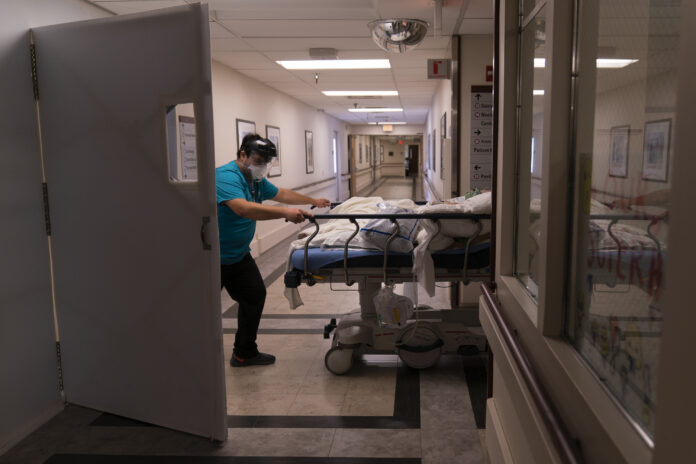
PROVIDENCE – Rhode Island’s major health insurers are taking divergent approaches to continuing no-cost coverage for their members who contract COVID-19 and seek treatment.
Blue Cross & Blue Shield of Rhode Island has stated that effective April 1, it will no longer cover the cost of copays, deductibles and coinsurance for members who are diagnosed with the viral disease and use in-network providers.
The company had instituted that policy waiving the so-called ‘cost sharing payments’ on April 3, 2020, as the national public health emergency began. At that time, Blue Cross said it would continue covering those out-of-pocket expenses for the duration of the pandemic. In an update on Jan. 6, the company emphasized that this was a temporary policy, and that Medicare Advantage Plan customers would have their co-sharing covered only through the earlier of March 31 or the end of the federal public health emergency. Commercial plans would have the cost share waived only through March 31.
Blue Cross Blue Shield of Rhode Island is the state’s largest health insurer in Rhode Island by membership. It covers about 382,633 people and has 17,181 people directly insured, according to the Providence Business News 2021 Book of Lists.
In a statement, a spokeswoman for Blue Cross & Blue Shield said the company had extended the waiver several times since it was first instituted. The original plan was to have stopped covering those out-of-pocket expenses as of Dec. 31, she said.
“However, when cases began to rise in November, BCBSRI made the decision to extend the cost-sharing waiver to March 31, 2021,” a spokeswoman said. “More recently, a year into the pandemic, with vaccines becoming more widely available, we felt it was appropriate to let the cost sharing waiver expire as had been planned.”
Neighborhood Health Plan of Rhode Island, a nonprofit, insures about 208,000 people and most of the state’s Medicaid market. It said Friday it would continue to fully cover expenses related to COVID-19 through the pandemic. It released a statement from President and CEO Peter Marino, who said Neighborhood wanted to assure its members and providers that it was not rolling back coverage benefits, unlike other health insurers.
It will continue to cover associated costs of COVID-19 through the end of the state emergency due to the pandemic.
“Most of Neighborhood’s members live in the communities hardest hit by the pandemic and I want to assure our members that Neighborhood is, and will continue to be, here for them during these challenging, uncertain times,” Marino said.
UnitedHealthcare of New England, which insures nearly 165,500 people in Rhode Island, could not be reached for immediate comment Friday.
While insured customers may only pay modest amounts for copays to see a physician or a specialist, many health insurance plans in Rhode Island, as elsewhere in the country, have deductibles that can run into the several thousands for treatment of illnesses.
It was not immediately clear Friday how much of a financial burden had been taken on by the insurers in covering the cost sharing typically paid by their customers.
Both Blue Cross & Blue Shield and Neighborhood Health stated they are continuing to fully cover the cost of COVID-19 testing and the cost of vaccination for consumers.
As of this week, about 12% of the Rhode Island population has been fully vaccinated, according to the R.I. Department of Health.
The health insurance industry is populated with carriers that are private companies, but it is regulated in Rhode Island by the Office of the Health Insurance Commissioner.
Late Thursday afternoon, Health Insurance Commissioner Patrick Tigue, the former state Medicaid director, released a statement saying: “It is a priority of [Gov. Daniel J. McKee] and I to ensure that Rhode Islanders are protected from the harm that COVID-19 presents to their health and financial well-being. While my office is examining options to address this, it is my hope that commercial health insurers operating in Rhode Island will waive cost-sharing through the end of the public health emergency.”
In an interview, Tigue said Friday he is concerned that the end of waivers for copays, coinsurance and deductible payments for COVID-19 could create a financial barrier for people seeking treatment.
His office is looking at all of the ranges of possible actions that can be taken, he said, including having the state require companies to provide that additional financial coverage through the duration of the pandemic.
Commercial insurers, he said, need to “do the right thing.”
According to Tigue, in addition to Blue Cross & Blue Shield, United Healthcare has also stopped waiving the coshare costs. His office contacted all four insurers who cover Rhode Islanders for health care.
Tufts Healthcare, based in Watertown, Mass., is the smallest of the carriers. It insures about 64,000 people in Rhode Island, and according to Tigue has continued to cover coshare costs.
“I am looking at all of the options available. No decisions have been made,” Tigue said.
In a statement, Gov. Daniel J. McKee said he had already spoken with Tigue about the issue.
“I believe that commercial health insurers operating in Rhode Island should waive cost-sharing through the end of this public health emergency,” McKee said.
Mary MacDonald is a staff writer for the PBN. Contact her at macdonald@pbn.com.
Update: Adds paragraphs five and six to include comment from Blue Cross & Blue Shield of Rhode Island. Adds paragraphs 17-24 to include comments from Tigue and McKee.











